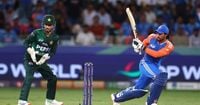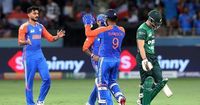The cricketing world is once again bracing itself for the most electrifying rivalry in the sport: India versus Pakistan in the Asia Cup 2025 final. Set to take place on Sunday, September 28, 2025, at the Dubai International Stadium, this clash is more than just a contest for a trophy—it’s a spectacle woven with history, tension, and the sheer unpredictability that only these two giants can produce.
For all the talk of cricket being a "war minus the shooting," as American political activist and author Mike Marqusee once quipped, this year’s final arrives with an even more volatile backdrop than usual. Off-field drama has been as intense as the on-field action, with provocative gestures, fines, and social media barbs dominating headlines. Yet, at the heart of the storm, cricket fans are preparing for a match that promises high-octane action and no shortage of storylines.
India enters the final as the unbeaten juggernaut of the tournament. Six consecutive victories—including a nail-biting Super Over win against Sri Lanka—have cemented their status as favorites. Their dominance has been spearheaded by the remarkable form of Abhishek Sharma, who has amassed 309 runs in just six games. His audacious strike rate of over 200 has left bowlers flummoxed and fans in awe. The next best in India’s batting lineup, Tilak Varma, trails far behind with 144 runs, underscoring Abhishek’s importance to the team.
But it hasn’t all been smooth sailing for the Men in Blue. Injuries have threatened to disrupt their momentum, most notably when Hardik Pandya suffered a hamstring scare during the game against Sri Lanka. Abhishek himself was seen cramping up under the punishing Gulf heat. Yet, bowling coach Morne Morkel provided a sigh of relief, stating, "Hardik will be assessed tomorrow morning. Both him and Abhishek suffered cramps. But Abhishek is fine." The reassurance couldn’t come at a better time, as India’s hopes hinge on their star opener’s fitness.
Despite the team’s winning streak, doubts linger about their batting depth. Suryakumar Yadav, the captain, is yet to deliver a commanding knock, and Shubman Gill has struggled to convert promising starts. The middle order, featuring Sanju Samson and Tilak Varma, has only flourished in less consequential matches. The big question looms: what happens if Abhishek fails early? India’s strategy in the back-10 overs has appeared shaky, and their plan B remains untested.
Pakistan, by contrast, has taken a rockier road to the final. Their campaign has been marked by fragile batting displays, with only Sahibzada Farhan managing to unsettle India’s Jasprit Bumrah in fleeting moments. Saim Ayub, once touted as Pakistan’s answer to Abhishek, has endured a nightmare run—four ducks and more wickets lost than runs scored at one stage. Hussain Talat and Salman Ali Agha have struggled against India’s formidable spin attack, led by Kuldeep Yadav and Varun Chakravarthy. Pakistan’s hopes may rest on their new-ball pair, Shaheen Shah Afridi and Haris Rauf, whose ability to dismantle India’s top order could turn the final into a low-scoring scrap.
As Pakistan’s head coach Mike Hesson wryly noted after their hard-fought win over Bangladesh, "The final is the only match that counts." Indeed, pedigree and form often count for little in the cauldron of an India-Pakistan final. The stakes are magnified, and every run, wicket, and misstep is etched into the annals of cricketing folklore.
The off-field drama has been impossible to ignore. The tournament began with India’s controversial "No Handshake Policy" during the opening clash, with Suryakumar Yadav pointedly turning away at the toss and post-match. The ICC responded with 30 percent fines for both camps. The tension has simmered throughout, fueled by cryptic and provocative social media posts from the Asian Cricket Council chief. Yet, in a rare display of sportsmanship, Suryakumar and Pakistan captain Salman Ali Agha did exchange a handshake at a pre-tournament press conference, offering a fleeting glimpse of camaraderie amid the rivalry.
Astrologer Greenstone Lobo has added another layer of intrigue, predicting that Pakistan could emerge as Asia Cup champions despite India’s status as favorites. Lobo compared the horoscopes of the two captains, noting, "Salman was born in 1993 when Neptune was at 25 degrees and Pluto was at 0 degrees, which is very powerful, extremely strong. And we are also looking at Suryakumar Yadav, who was born in 1990 with planet Pluto at 0 degrees, Neptune is strong, planet Z in a strong position, X is in a strong position." While he acknowledged both captains as "equals" in astrological terms, Lobo suggested that Pakistan’s team as a whole is "okay-ish" compared to India’s powerful squad. Still, he cautioned, "If Pakistan wins this match and wins the tournament, I wouldn’t be really surprised… Let such a small tournament be won by Pakistan. It’s okay, right. It’s a very insignificant tournament, right. Sri Lanka has won one Asia Cup and it doesn’t really matter, right." His comments have sparked debate among fans, adding to the sense of anticipation swirling around the final.
As the teams finalized their preparations, Pakistan’s captain Salman Ali Agha led a spirited practice session at the ICC Academy in Dubai on the eve of the match. Both squads are stacked with talent and intrigue. India’s lineup features Suryakumar Yadav (captain), Shubman Gill (vice-captain), Abhishek Sharma, Tilak Varma, Hardik Pandya, Shivam Dube, Axar Patel, Jitesh Sharma (wicketkeeper), Jasprit Bumrah, Arshdeep Singh, Varun Chakravarthy, Kuldeep Yadav, Sanju Samson (wicketkeeper), Harshit Rana, and Rinku Singh. Pakistan counters with Salman Ali Agha (captain), Abrar Ahmed, Faheem Ashraf, Fakhar Zaman, Haris Rauf, Hasan Ali, Hasan Nawaz, Hussain Talat, Khushdil Shah, Mohammad Haris, Mohammad Nawaz, Mohammad Waseem Jnr, Sahibzada Farhan, Saim Ayub, Salman Mirza, Shaheen Afridi, and Sufyan Moqim.
With the match set to begin at 8 pm IST, millions will tune in hoping for a contest worthy of the occasion. For India, the goal is clear: extend their unbeaten run and claim the Asia Cup, regardless of whether it’s a clinical performance or a scrappy win. As Morne Morkel succinctly put it, "Winning it ugly is still winning." For Pakistan, it’s about defying the odds, silencing critics, and seizing the moment on the grandest stage in Asian cricket.
No matter the outcome, Sunday’s final promises to be a spectacle—charged with emotion, drama, and the relentless pursuit of glory. The action is about to unfold, and cricket fans everywhere are ready for the fireworks.






